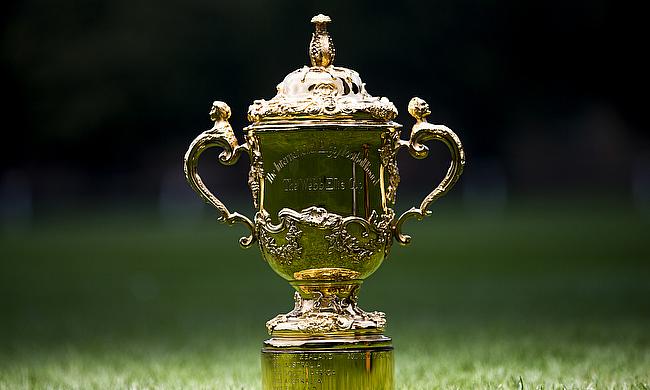Since its inception in 1987, the Rugby World Cup has grown to become the third-largest sporting event worldwide, rivaling only the Olympics and the FIFA World Cup.
This biennial spectacle is not just a platform to showcase athletic excellence, but it has also become a center of attention for global audiences and bettors alike, with Rugby World Cup betting odds drawing interest from both casual and dedicated followers of the sport. It's not just a powerful cultural and economic force impacting host nations and the international rugby landscape, but also an event that encourages informed speculation and prediction.
Over the decades, the tournament has evolved in terms of participation, competitiveness, and global influence. The following exploration delves into this fascinating journey, tracing the growth, impact, and transformation of the Rugby World Cup—a true 'Cup of Giants.'
The Genesis of the World Cup
The Rugby World Cup, a brainchild of the International Rugby Board (now known as World Rugby), emerged in 1987, permanently altering the landscape of rugby. Before its inception, the idea of a global rugby tournament faced staunch opposition, particularly from traditional rugby powerhouses who preferred existing tours and test series. Despite these initial reservations, the inaugural World Cup, co-hosted by Australia and New Zealand, was a resounding success.
The tournament featured 16 teams, a number that has since grown to 20, and included representative nations from every continent. The initial competition witnessed a total of 6,000 points scored over 32 matches. New Zealand, demonstrating their rugby prowess, triumphed, defeating France 29-9 in the final at Eden Park, Auckland. This inaugural tournament established the quadrennial Rugby World Cup as the pinnacle of international rugby union competition, a status it retains today.
The Growth of the Game
The growth of Rugby, particularly since the advent of the World Cup in 1987, has been astronomical. The inaugural World Cup featured 16 teams; this expanded to 20 by 1999 and there's ongoing discussion to further increase this to 24. The tournament's global television audience has seen a remarkable rise. In 1987, the competition reached an estimated 300 million people. By the 2019 World Cup, this figure had soared to 857 million, indicating a nearly threefold increase. Furthermore, World Rugby reported that as of 2018, there were more than 38 million people playing rugby globally, across 121 countries. The sport has shown a consistent upward trajectory in popularity, demonstrating rugby's transformation from a niche game to a major global sport.
Memorable Moments
Rugby World Cup history is punctuated with moments of unforgettable brilliance that have left indelible imprints on the sport. One of the most legendary is Jonah Lomu's display in the 1995 World Cup, where he scored seven tries, including an astounding four in the semi-final against England. Another iconic moment came in 2003, when England's Jonny Wilkinson kicked a last-minute drop goal in extra time, securing England's first and only World Cup victory. Fast forward to 2015, Japan delivered one of the biggest upsets in rugby history, defeating two-time champions South Africa in a nail-biting 34-32 victory, forever remembered as the "Miracle of Brighton". These moments, among others, have not only shaped the narrative of rugby but also amplified its global popularity and influence.
Impact on Host Nations
The Rugby World Cup has a significant and lasting impact on host nations, both economically and socially. When England hosted the tournament in 2015, it brought in a staggering £2.3 billion ($2.98 billion) in economic output, making it the most successful Rugby World Cup to date. Furthermore, around 466,000 international visitors came to England specifically for the event, spending approximately £958 million ($1.24 billion). Beyond economic benefits, hosting the World Cup can unify and inspire nations. This was particularly evident in South Africa during the 1995 Rugby World Cup, where, despite the fresh wounds of apartheid, the nation united behind their victorious team, symbolized by the iconic image of President Nelson Mandela presenting the Webb Ellis Cup to team captain Francois Pienaar.
The Cultural Significance
The cultural significance of the Rugby World Cup extends far beyond the pitch. As a global event, it offers a unique platform for cultural exchange. For instance, New Zealand’s Haka, a traditional Maori war dance, has become a global phenomenon, watched and admired by millions. According to World Rugby, the 2019 World Cup in Japan, the first to be held in Asia, reached a record-breaking cumulative audience of more than 857 million people, promoting not only the sport but also a rich intercultural dialogue. Moreover, the event encourages values like respect, solidarity, and discipline. A survey conducted after the 2015 World Cup found that 93% of fans believed the tournament had a positive impact on rugby’s image, underscoring the cultural significance and unifying power of this event.
Looking to the Future
As we look to the future, the Rugby World Cup shows signs of continued evolution and growth. The 2023 tournament set to be held in France is already aiming to improve on past iterations. For instance, World Rugby has announced extended rest periods for all teams to ensure greater competitiveness and player welfare. Moreover, the sport's global outreach is expanding, with emerging rugby nations like the USA and Japan showing increased interest and potential. The World Rugby strategy for 2021-2025 outlines an ambition to increase the global rugby audience to 1 billion. There are also discussions to potentially expand the number of teams participating in the World Cup from 20 to 24, which would further globalize the sport, showcasing the commitment to advancing this exhilarating sport.
Conclusion
From its genesis to its ongoing evolution, the Rugby World Cup has undeniably become a global phenomenon. It has witnessed extraordinary growth, both in participant numbers and in its global audience. The Cup's many memorable moments have etched themselves into the annals of sporting history, whilst its impact on host nations extends beyond the economic, touching the very social and cultural fabric of societies. With its rich cultural significance and the unifying power it holds, the tournament continues to foster a spirit of international camaraderie. As we look to the future, the ongoing growth and evolution of this magnificent event promise a thrilling spectacle, furthering the appeal of rugby as a truly global sport.


